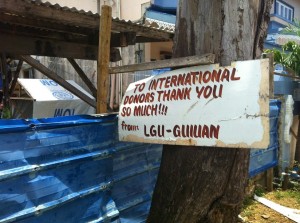SAN FRANCISCO – Communities affected by Typhoon Yolanda are steadily recovering, “regaining footholds” in one of the world’s most at-risk regions a year and a half after the deadliest storm in recorded Filipino history, says a report by a major philanthropic organization.
“After Yolanda,” released by Give2Asia, details the recovery of some of the hardest hit areas of the Visayas and highlights the importance of strong relationships and trust between affected communities, local NGOs and international donors in the recovery process.
The report is a result of the organization’s $1.84-million response to the super-typhoon that struck in November 2013. Give2Asia is a San-Francisco-based nonprofit that aims ito strengthen communities by building trusted networks for charitable investment.
While a portion of its grants met the immediate needs of the storm’s survivors, Give2Asia also allocated for long-term rehabilitation, especially in the coastal communities that were most severely affected.
Of the $1.2 million Give2Asia has donated thus far, 31 percent went to immediate relief, 24 percent to ongoing health programs, 23 percent to education, 10 percent to the rehabilitation the local economy and 9 percent was invested in disaster resilience to prevent the destructive effects of future storms. The remainder was used to fill gaps in psychosocial care through arts programs.
The Guiuan Development Foundation, Inc. (GDFI), supported by Give2Asia, provided disaster risk-reduction training to Maliwaliw, the island community where Yolanda first made landfall.
A comprehensive disaster plan in vulnerable locations like Maliwaliw, improves mortality rates in disasters and can significantly shorten future recovery periods.
One month after the training, Typhoon Ruby traumatized still-recovering regions as it took an almost identical path through the Visayas.
As skies darkened over Maliwaliw, community volunteers helped mobilize residents, especially the elderly and children, into designated safe centers.
A week after the storm passed, one trainee wrote, “The circumstances were difficult but the knowledge that we acquired from the trainings made things easier – especially for us elderly.”
Another trainee agreed, saying, “The training provided us with so much help, the residents were so prepared — people voluntarily evacuated to designated evacuation centers.”
“The outpouring of support from the international donors was amazing, and Give2Asia’s role was to target a portion of that global campaign to help local Philippines-based organizations on the ground making a long-term commitment to recovery and resilience-building,” said Give2Asia President & CEO Birger Stamperdahl.
“We are extremely grateful to the corporations, Filipino diaspora and other donors who gave with both their hearts and their minds to fund truly impactful, local programs.”
To learn more about Give2Asia, its disaster recovery programs and to read the report, visit www.give2asia.org/after-yolanda
RELATED STORIES
Give2Asia launches Ruby assistance fund drive
Give2Asian launches ‘Yolanda One Year Later’ fund


